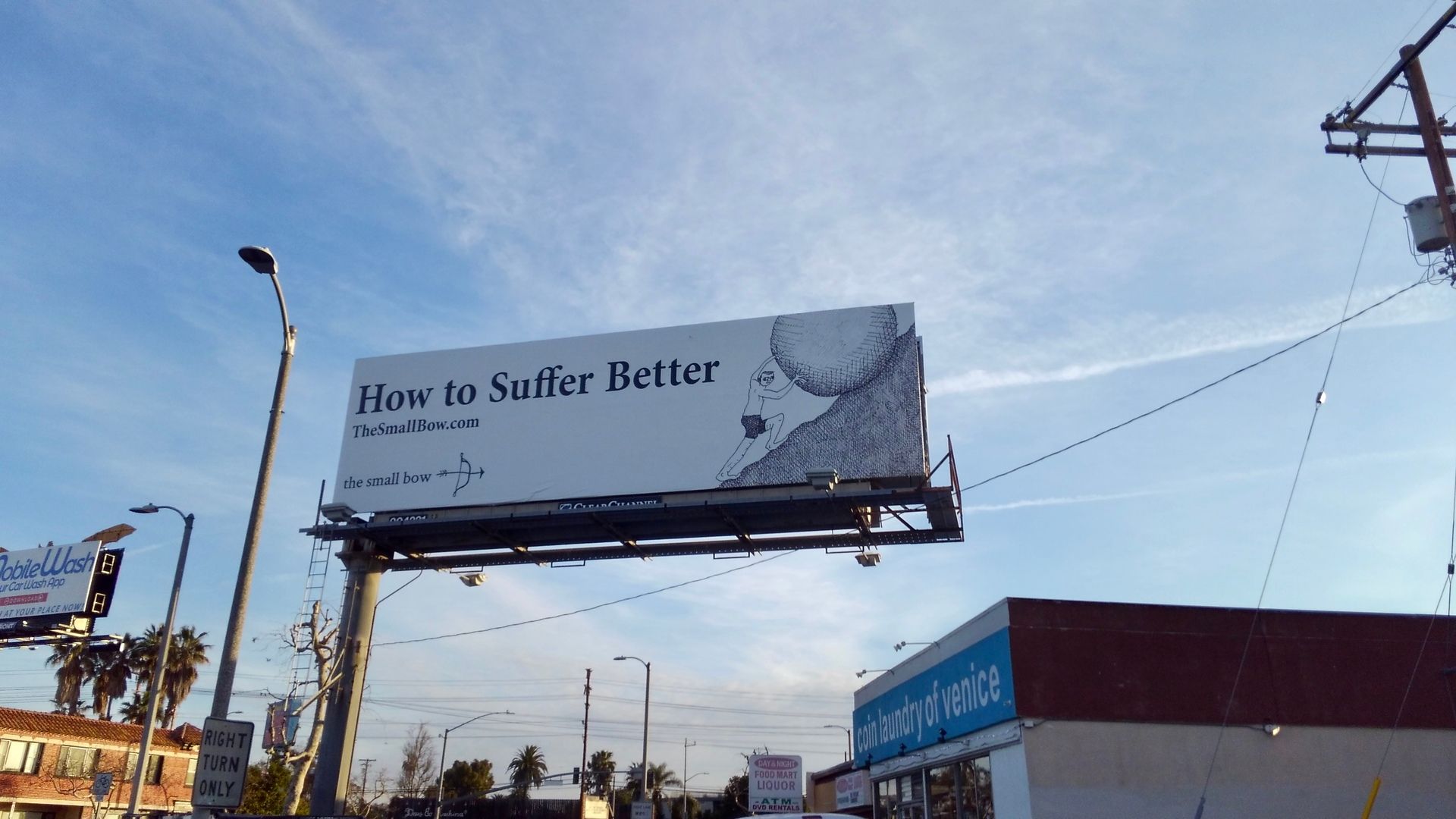
Reminder: September is the SEVENTH anniversary of The Small Bow and it is also Recovery Month.
If our newsletter has helped you feel less wicked and alone, less shitty or afraid, then please consider financially supporting us. Subscribers gain access to the entire archive, the Sunday essay, the complete recommendations roundup, and the comprehensive rundown of my weekly recovery program.
We use your money to help cover the costs of all our editorial operations, including our freelancers, Edith’s illustrations, our meetings, and the production of the podcast. We promise not to blow it on any more billboards.
Thank you for letting us be of service and for your continued support. To commemorate our anniversary and Recovery Month, we’re offering a 20% discount on all annual subscriptions throughout September.
If the cost is still prohibitive or you wish to send TSB to someone you love, contact us. We’ll happily pass along a free annual subscription to those who need it most.
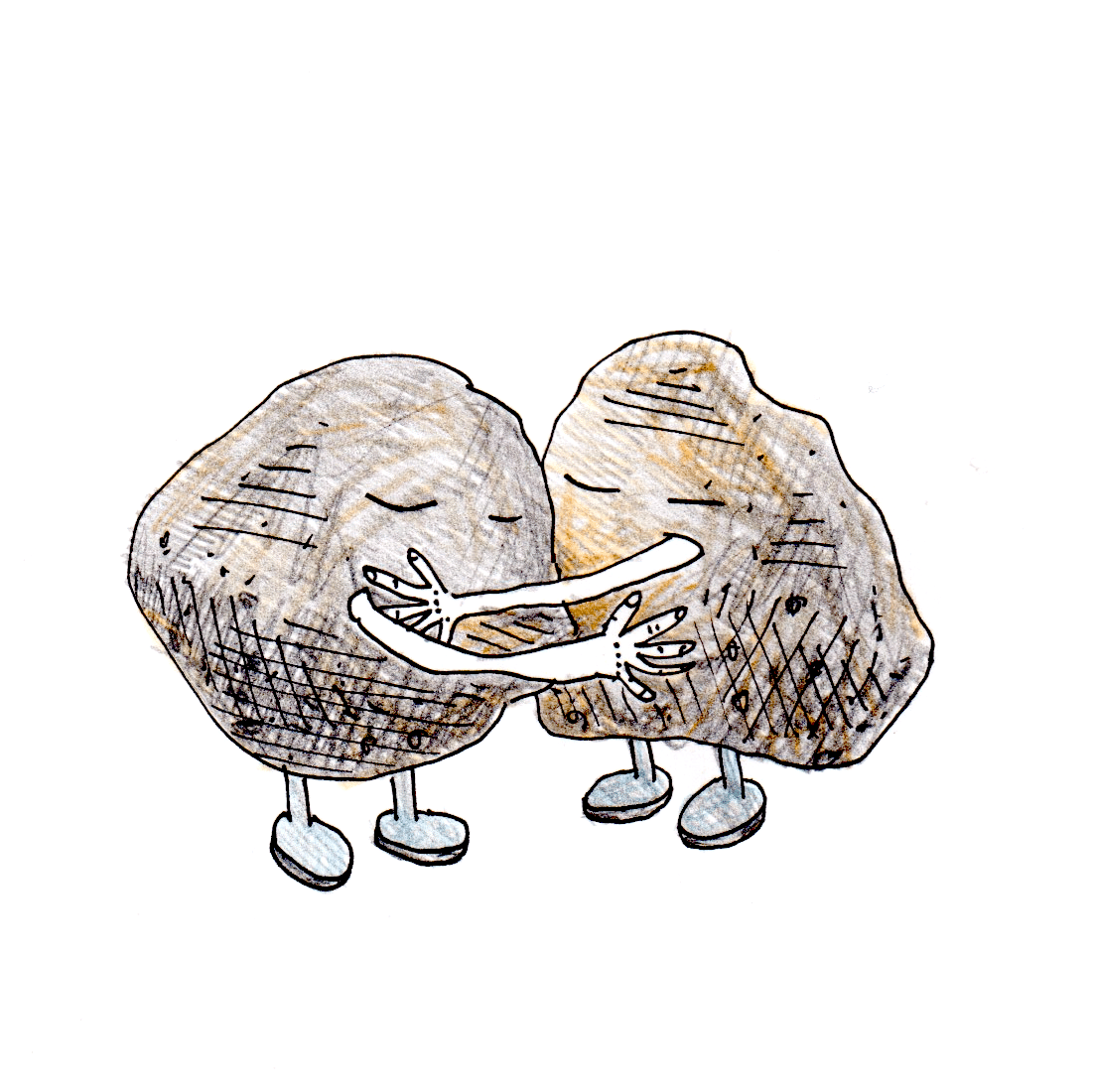
Good morning. It’s the third Tuesday of the month so it’s time for another batch of wisdom from a notable Sober Oldster. Today’s guest is author Elizabeth Gilbert.
Thanks again to Sari Botton from Oldster for the collaboration. —TSB Editor
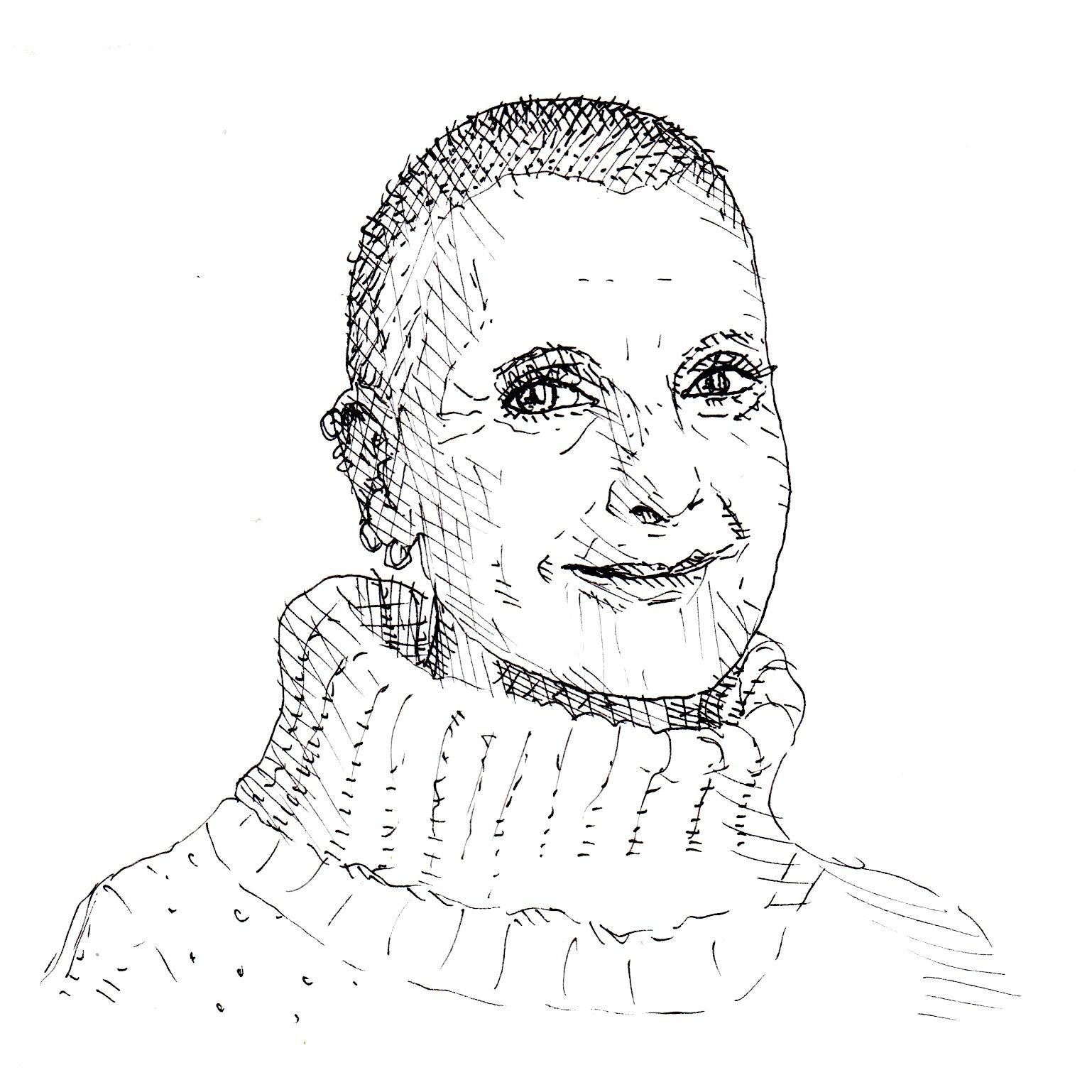
How old are you, and how long have you been in recovery?
I’m 56 years old and I’ve been in recovery for six-and-a-half years.
How did you get there?
A beloved friend of mine who had many years of recovery in AA suggested that I get myself to a Sex and Love Addicts Anonymous meeting — which was interesting, because that wasn’t even her fellowship, but she could see my problem, and knew that I was drowning. She sat me down and said something like, “I’ve been watching you hurt yourself with romantic drama, chaos and obsession for 20 years” — (actually, I’d been hurting myself that way for more like 40 years, but she’d only seen the second half of it) — “and I think you might be served by checking out this program.”
At that point, I was neck deep in yet another broken heart, back on the bathroom floor every night sobbing in despair, having done what I always do. I had, once again, given my entire life (body, mind, spirit, health, all my resources) to somebody, with the hope that they might love me enough to save me from myself. In SLAA they say “it’s never about the person; it’s always about the pattern” — and my pattern had always been to bounce from one super-intense relationship to another, always running toward somebody and/or away from somebody else, and ending up gutted and degraded again and again. I’d only been doing that since I was about 14 years old, and it had cost me dearly.
So my friend sent me to SLAA, and I went for a while, but found it depressing and far too confronting, so I stopped going. A year later, I picked up another qualifier, fell into desperate love all over again. I acted just as crazy as ever and ended up just as destroyed as ever. God bless her, that same friend 12-stepped me again, daring to say, “Maybe you want to go to one of those meetings again?”
Humbled, I went back, and I haven’t left the rooms since. Within a few months of coming into SLAA, I also put down drugs and alcohol. So I have a few sober dates, for a few different substances and behaviors. But it’s been about six-and-a-half years of not using anyone or anything to alter my mood or mind — and that’s a miracle.
What are the best things about being in recovery?
The complete transformation of consciousness that is possible through the miraculous spiritual technology of the 12 Steps. You have to understand that I had tried quite literally everything the world had to offer to make myself feel better, to stop acting out, and to be emotionally healthy — from tons of therapy, to pharmaceuticals, to gurus of all manner, to plant medicine, to every kind of self-help and self-improvement pursuit out there — but nothing ever worked for me (meaning: nothing transformed my behavior) until I came into the rooms of 12-step and started really working those steps with an experienced, older, and very disciplined sponsor.
I remember when I was a newcomer in withdrawal, jonesing for anything or anyone that would take me out of my awful discomfort, an old-timer promised me that if I kept coming to meetings and if I worked the steps, the day would come when I wouldn’t even want anymore the things I used to crave with all my heart. I thought she was insane, to suggest such a thing. I mean, I knew I had to put down these substances and behaviors, and I was willing to put them down, but I was sure I would never stop CRAVING them.
But something happened in the midst of working those steps, and a whole bunch of cravings were lifted. And just for today, uncontrollable urges and ultimately self-destructive desires are not controlling my life anymore. I think that’s simply astonishing.
What’s hard about being in recovery?
I honestly cannot think of anything about being in recovery that is harder than not being in recovery.
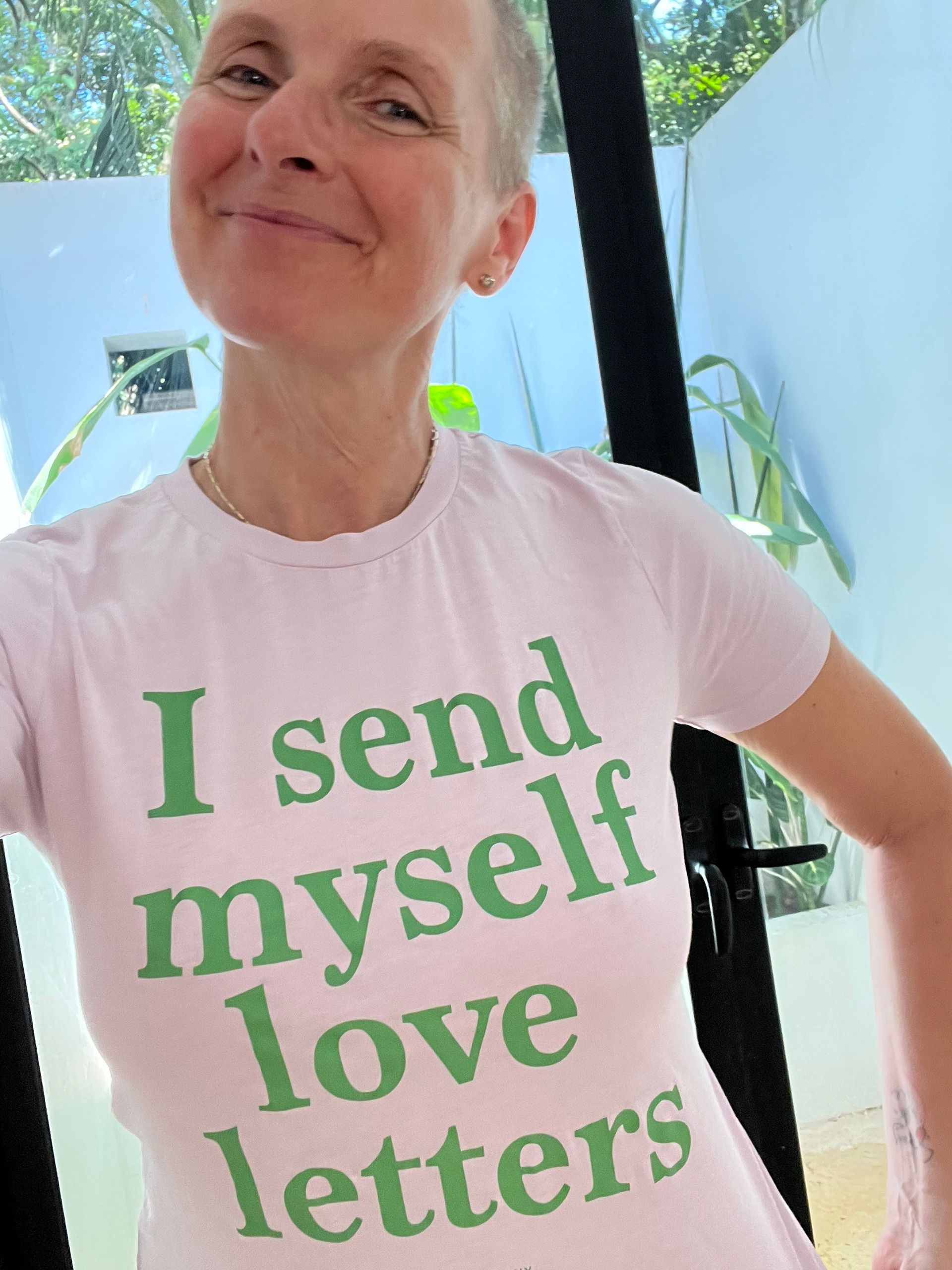
How has your character changed? What’s better about you?
My level of self-accountability has changed immensely. One of the ways that my sex and love addiction manifested was in believing that if I could just get the right amount of love from the right person, then I would finally be okay. What I was willing to risk, sacrifice, and jeopardize in order to get that love was limitless. Ultimately, this made me into a user of people — someone who disregarded the humanity of others in order to get what she needed out of them.
I’m not beating myself up when I say this: It’s simply true. And while I understand completely the circumstances in my early life that turned me into such a desperate soul, and I have nothing but sympathy and love for that little kid, the adult version of me could be a terribly manipulative and super-shady vampire. This was always painful for me, because I knew that my vampiric behavior was wrong. I could see that I was hurting myself and others. This was excruciating and shameful, because it was at complete odds to what I believe is my true nature — which is to be kind, loving, honest, and generous. But I am none of those things when I am in my addiction.
As my recovered self, on the other hand, I can be the fullest and best expression of my true nature. This is not only a tremendous relief for me, but also a public service. Any day where I am not manipulating, controlling, or using another human being is a banner day — for me, and for others — and I’m grateful. But for that to work, I have to learn how to be both God-reliant and self-accountable. That’s what the program has brought me, and it’s a tremendous liberation.
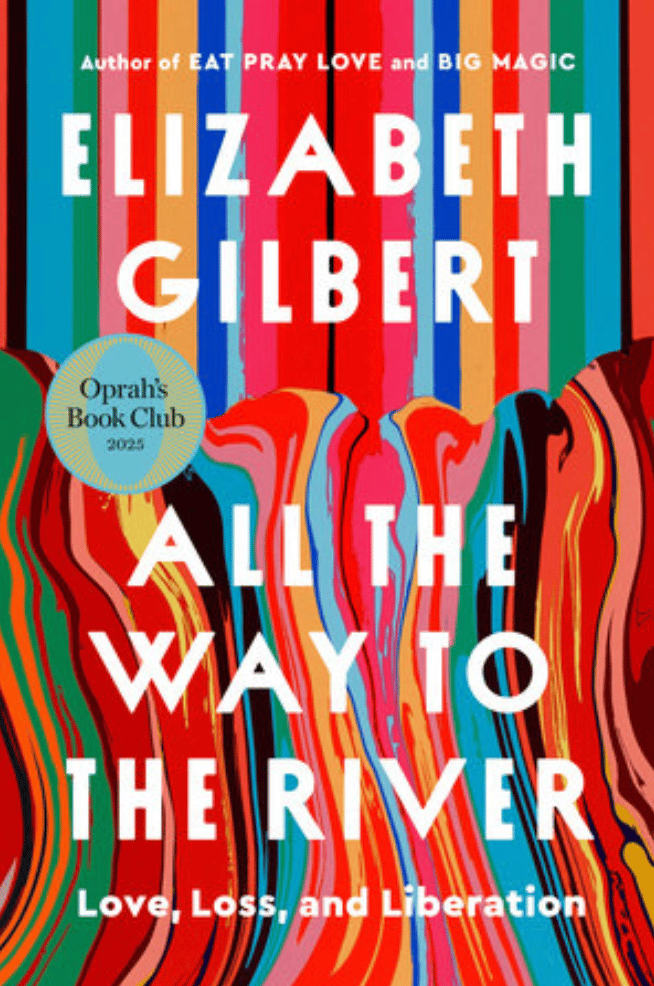
What do you still need to work on? What “character defects” do you still wrestle with?
Arrogance, contempt, superiority, certainty. Richard Rohr says that for real recovery to occur, “the imperial ego” has to go. My imperial ego rears its head in 12-step meetings a lot, where I (a tiny little sober baby, only six years into recovery) apparently already think I’m doing it better than other people. My imperial ego is like: “Why can’t they get their fourth steps done? Why aren’t they working with a sponsor? Why don’t they ever do any service? Why are they only going to meetings once a week? Why isn’t their camera on? Why don’t they ever share? Why don’t they go no-contact with their qualifiers? Why aren’t they doing their top-lines? Why aren’t they turning over 10th steps? Why aren’t they doing two-way prayer? Why don’t they stop complaining all the time, and start a gratitude practice?”
Oh, yes — I definitely have all the answers as to how everyone else should be getting sober!
Thankfully, I had a sponsor early on who taught me that every single thing I think someone else needs to be doing is exactly what I need to be doing. So my judgments of others are actually God’s instructions to me for my own life. My sponsor would say to me, “You think that person needs to be turning over more 10th steps, Liz? Then YOU need to be turning over more 10th steps. You think someone else needs to be doing more service? Than YOU need to be doing more service.”
When I pray to be relieved of the bondage of self, this is what I’m praying will be lifted: That spiritual arrogance of my imperial ego. Dear God, please save me from thinking I know how anyone else should be working their program. Please take away everything I think I know, and show me how I can of service. Please help me keep my eyes on my own work.
Those are daily prayers for me. Often multiple times a day.
What’s the best recovery memoir you’ve ever read? Tell us what you liked about it.
Speaking of Richard Rohr, I love his book BREATHING UNDER WATER: SPIRITUALITY AND THE TWELVE STEPS. I like how he reframes the 12-steps as a spiritual path that could be useful for everyone, and I resonate with his belief that the 12 steps of recovery are America’s “only, but extremely significant” contribution to world spirituality. I love his articulate reflections on the miracle of how a country so bloated by ego and excess and the constant thriving to be the best managed to arrive at a recovery program that begins with an admission of absolute defeat and powerlessness. It’s almost like the 12 steps are the remedy for America itself, because the program takes all our cultural assumptions about power and success (which are obviously not working for us or for the world) and turns them on their head. The 12-steps say such radical things as: You will win by surrendering; You will find spiritual victory in admitting that you have lost; You will get more control by giving up control; You can only keep what you have by giving it away.
Such gorgeous and wild paradoxes!
I give a copy of this book to all my sponsees when we get to Steps 6 and 7, because Rohr’s reflections on those steps — the most mystical, mysterious, and often overlooked of the steps — are so magnificent.
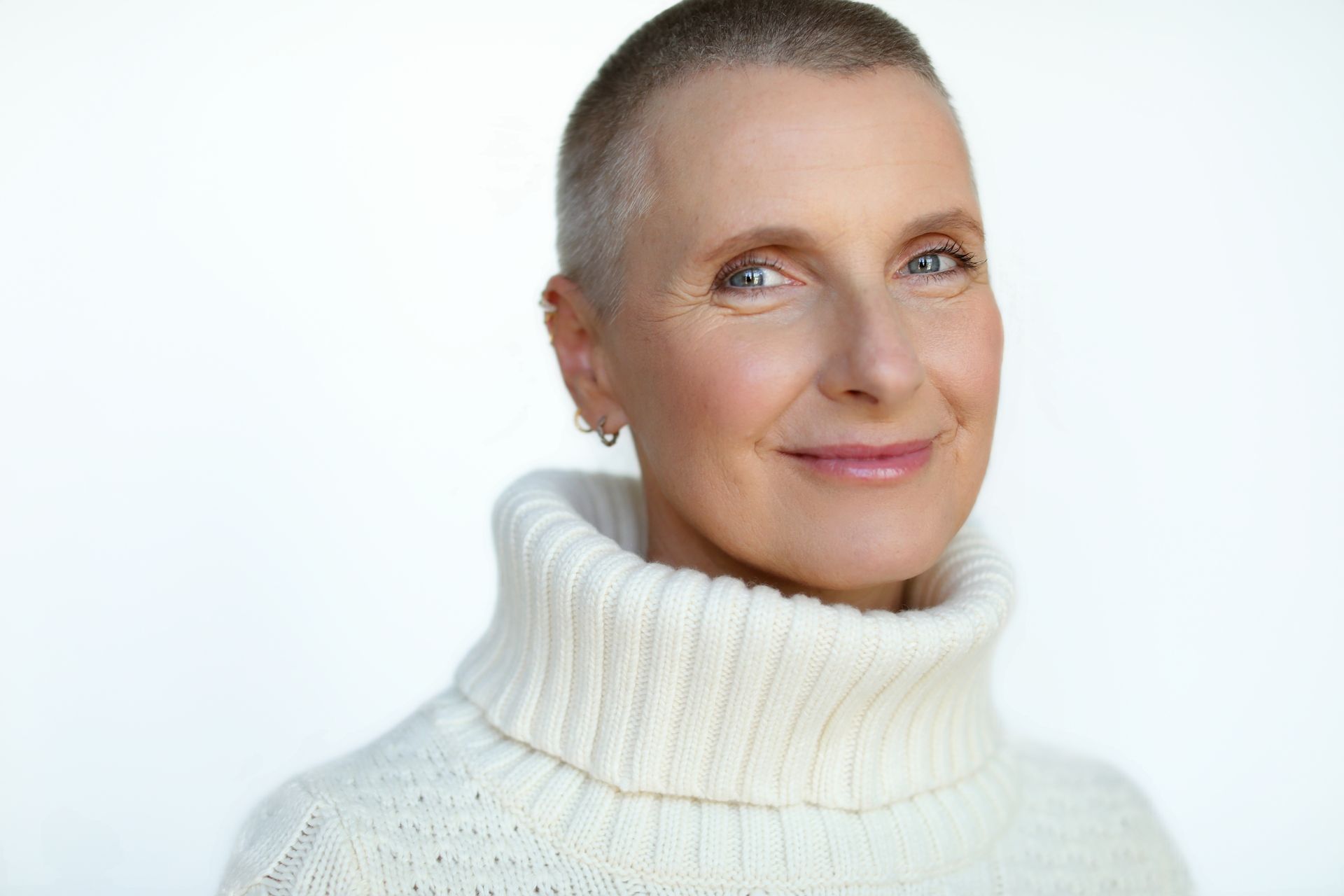
What are some memorable sober moments?
I was at a dinner party about year into my sobriety and everyone was drinking but me. Someone at the table insulted me quite out of nowhere — like, she kind of stabbed me right in the guts with her words, and right in front of everyone. It hurt, yes, and definitely took me by surprise because it seemed to come out of nowhere. But because I was sober, I was able to clock how alcohol had changed this person’s personality throughout the night, and how she was glassy-eyed and slurring. I was able to see how she wasn’t really THERE, how this wasn’t really HER speaking, but the booze. I could see how out of control she was, and how ashamed and shook she herself seemed to feel about what she had said
Maybe the insult was, in fact, her true opinion about me, or maybe it wasn’t — I’ll never know. But I knew for sure that she would never have said those words six drinks earlier in the evening.
Seeing her recklessness and subsequent shame made me feel so grateful that I was not six drinks in, myself. And I knew that if I’d had any mind-altering substances coursing through my body when the insult was launched, I wouldn’t have been able to be calm, detached, and clear-headed about having been insulted.
That was maybe the first night when I saw what a superpower sobriety is—how it allowed me to stand a bit of a safe remove from the human drama and messiness that was going on at the table, and to not have be pulled into every bit of chaos that was happening around me. It felt kind of amazing, to be able to hold my serenity in such a moment. I remember thinking that night, “I never want my perspective be clouded or diminished by anything again.”
Are you in therapy? On meds? Tell us about that.
No more meds, and — just for now — no therapy. I did do an intensive trauma retreat a few years ago, to help with some rough and unhealed early childhood trauma, and that was really helpful and empowering. But besides that, I don’t feel the need for therapy today—although I am so grateful to all the therapists who sincerely tried to help me over the years. They did their best, truly, but I honestly think that my God-sized hole, in the end, could only be reached and healed by God.
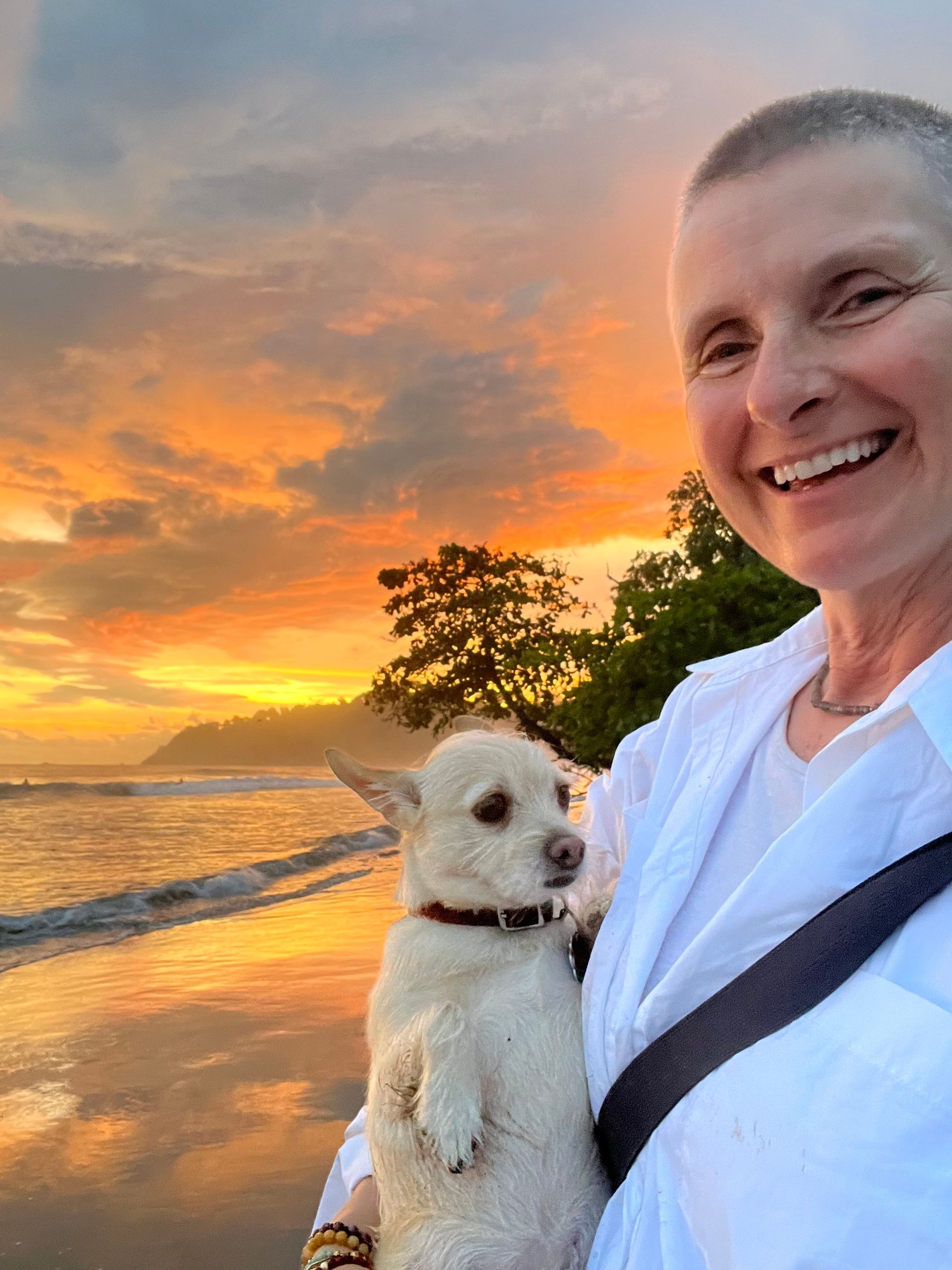
What sort of activities or groups do you participate in to help your recovery? (i.e. swimming, 12-step, meditation, et cetera)
Meditation, two-way prayer, breathwork, yoga, walks with my dog, and lots of 12-step meetings. I go to all the relationship meetings: Al-Anon, ACA, CODA, SLAA — because relationships of all kinds can trigger my fears and resentments, and that’s where I need work. But I also love an open AA or NA meeting, especially when I’m traveling. The best people are always in those meetings, with the most inspiring recovery. I work with a sponsor, and I sponsor three or four people at a time. I get so much recovery from taking people through the steps, the way I was taught. It really keeps my sobriety fresh and robust, to work with someone who is ready to put their addiction down. It’s so sacred.
Boundaries are also really important to my recovery. Learning that people will not die if they hear the word “no” come out of my mouth has been key. I have a promise to myself try to do something everything year that deepens my spiritual health. (I recently did a five-day darkness meditation retreat in Oregon, where I sat in complete darkness and solitude for five days. This, from a woman who used to not be able to stand her own company for five minutes!) I do a lot of Byron Katie worksheets and 10th step turnovers, to try to get out from under my fears and resentments (a fellow and I call 10th Steps our favorite sport!). And Karaoke, on a weekly basis, releases something within me that cannot be released any other way.
Are there any questions we haven’t asked you that you think we should add to this? And would you like to answer it?
I would just like to share this: I identify as a low-bottom, skid-row sex and love addict, and a blackout codependent. These are process and behavioral addictions, not substance addictions, but they are deadly, dangerous, and life-destroying, and have — in fact — brought me very close to both suicide and homicide. I come from a long line, on both sides of my family tree, of alcoholics and various sorts of addicts, and their desperately codependent enablers and would-be rescuers. Many people in my family still struggle with addiction, depression, anxiety — this is my inheritance. By all rights, I should be all up in SOMETHING self-destructive today (whether it’s a man, a muffin, a martini, or a Mastercard) but just for today, I’m peaceful, healthy, productive, contented and well — and happily self-supporting and self-accountable. That’s a fucking miracle, and I don’t use the world miracle lightly.
With recovery, it is possible to transcend your genetic and cultural destiny, is what I’m saying. If a person with a mind and a history as chaotic as mine can have a good and peaceful day — and can then string a whole bunch of those good days together, one day at a time, into a better life — then truly, anyone can.
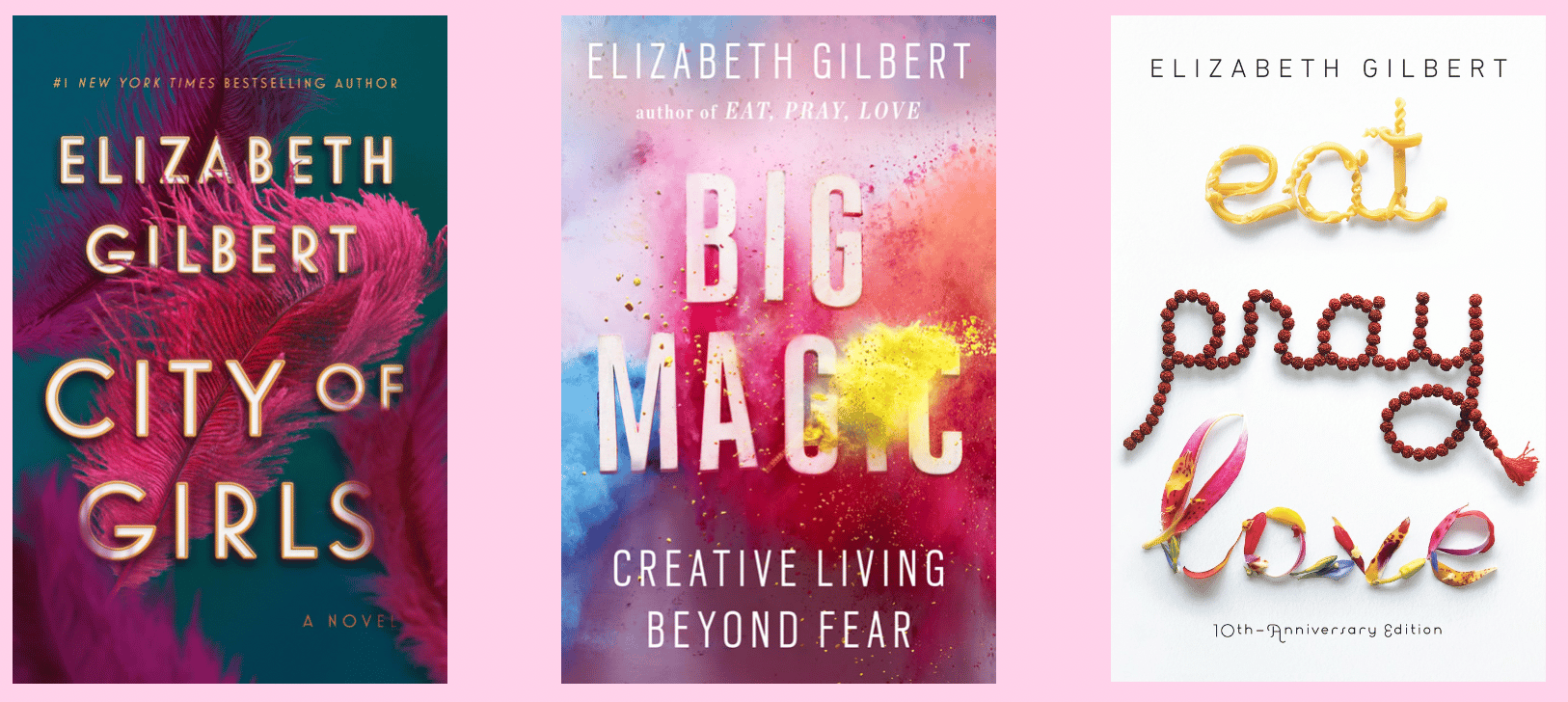
**********************************************************************
Elizabeth Gilbert is the author of ten works of fiction and non-fiction, including EAT PRAY LOVE, BIG MAGIC, THE SIGNATURE OF ALL THINGS, and the latest: ALL THE WAY TO THE RIVER.
******
This monthly interview series is a collaboration between Oldster Magazine and The Small Bow.
MORE IN THIS SERIES:
*****
This is The Small Bow newsletter. It is mostly written and edited by A.J. Daulerio. And Edith Zimmerman always illustrates it. We need your support to keep going and growing.
We send it out every Tuesday and Friday. For $7 a month or $60 per year, you also get a Sunday issue and access to the full TSB archives.
If you’d like to check in with A.J. and learn more about our recovery meetings, here’s where he can be reached: [email protected].
Also, follow us on Instagram for updates and more illustrations from Edith. You can also support Edith directly!

